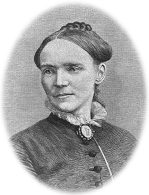Sweet, blind singer over the sea,
Tuneful and jubilant! how can it be,
That the songs of gladness, which float so far,
As if they fell from the evening star,
Are the notes of one who never may see
"Visible music" of flower and tree,
Purple of mountain, or glitter of snow,
Ruby and gold of the sunset glow,
And never the light of a loving face?
Must not the world be a desolate place
For eyes that are sealed with the seal of years,
Eyes that are open only for tears?
How can she sing in the dark like this,
What is her fountain of light and bliss?
Oh, her heart can see, her heart can see!
And its sight is strong, and swift and free.
Never the ken of mortal eye
Could pierce so deep and far and high
As the eagle vision of hearts that dwell
In the lofty, sunlit citadel
Of Faith that overcomes the world,
With banners of Hope and Joy unfurled,
Garrisoned with God's perfect Peace,
Ringing with pæans that never cease,
Flooded with splendour bright and broad,
The glorious light of the Love of God.
Her heart can see, her heart can see!
Well may she sing so joyously!
For the King Himself, in His tender grace,
Hath shown her the brightness of His face:
And who shall pine for a glow-worm light,
When the Sun goes forth in His radiant might?
She can read His law, as a shining chart,
For His finger hath written it on her heart;
She can read His love, for on all her way
His hand is writing it every day.
"Bright cloud" indeed must that darkness be,
Where "Jesus only" the heart can see.
Her heart can see! her heart can see,
Beyond the glooms and the mystery,
Glimpses of glory not far away,
Nearing and brightening day by day;
Golden crystal and emerald bow,
Lustre of pearl and sapphire glow,
Sparkling river and healing tree,
Evergreen palms of victory,
Harp and crown and raiment white,
Holy and beautiful dwellers in light;
A throne, and One thereon whose face
Is the glory of that glorious place.
Dear blind sister over the sea!
An English heart goes forth to thee.
We are linked by a cable of faith and song,
Flashing bright sympathy swift along;
One in the East and one in the West,
Singing for Him whom our souls love best,
"Singing for Jesus," telling His love
All the way to our home above,
Where the severing sea, with its restless tide,
Never shall hinder, and never divide.
Sister! what will our meeting be,
When our hearts shall sing and our eyes shall see!
—Frances Ridley Havergal (1836-1879)
|
